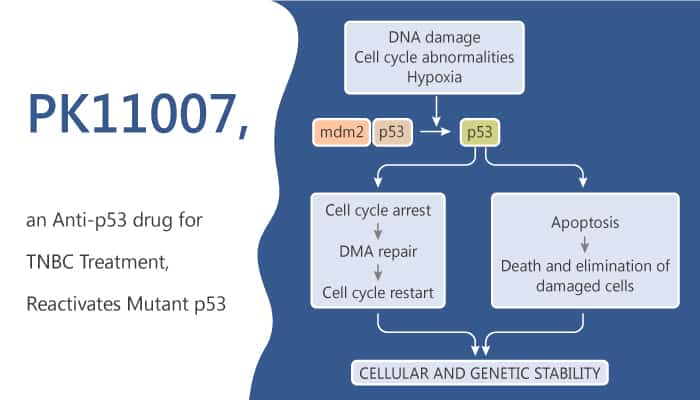The p53 function in cell cycle arrest, DNA repair, senescence and apoptosis induction in response to mutagenic stimuli, and, to exert those functions, p53 acts as a transcriptional factor. P53 is a transcription factor able to regulate several intracellular pathways involved in cell survival, DNA-repair, apoptosis, and senescence. Most p53 mutations in human cancer are missense mutations. In fact, only 10-15% of TP53 mutations are disruptive mutations. TP53 is the most frequently mutated gene in invasive breast cancer. The tumor suppressor p53 has the most frequently mutated gene in human cancers. PK11007 is a mild thiol alkylator with anticancer activity in several cell lines, especially those with mutationally compromised p53.
PK11007 stabilizes p53 in vitro via selective alkylation of two surface-exposed cysteines without compromising its DNA binding activity. Especially, PK11007 reactivates unstable p53 in some cancer cell lines, leading to the up-regulation of p53 target genes such as p21 and PUMA. More generally, PK11007 is a lead for anticancer drugs that target cells with nonfunctional p53 or impaired reactive oxygen species (ROS) detoxification in a wide variety of mutant p53 cells.

PK11007 induces ROS in mutant p53 cells.
PK11007 acts independently of mutant p53 by depleting GSH and increasing concentration of ROS. Particularly, PK11007 increases protein and mRNA levels of the p53 target genes p21 and PUMA. Moreover, PK11007 preferentially inhibits the viability of gastric and breast cancer cell lines with mutationally compromised p53 compared to cell lines containing wild-type p53.
All in all, PK11007 effectively kills cancer cells, especially with null or mutant p53 background, and shows only low cytotoxicity toward normal cells. PK11007 is a potential biomarker role for mutant p53 in breast cancer.